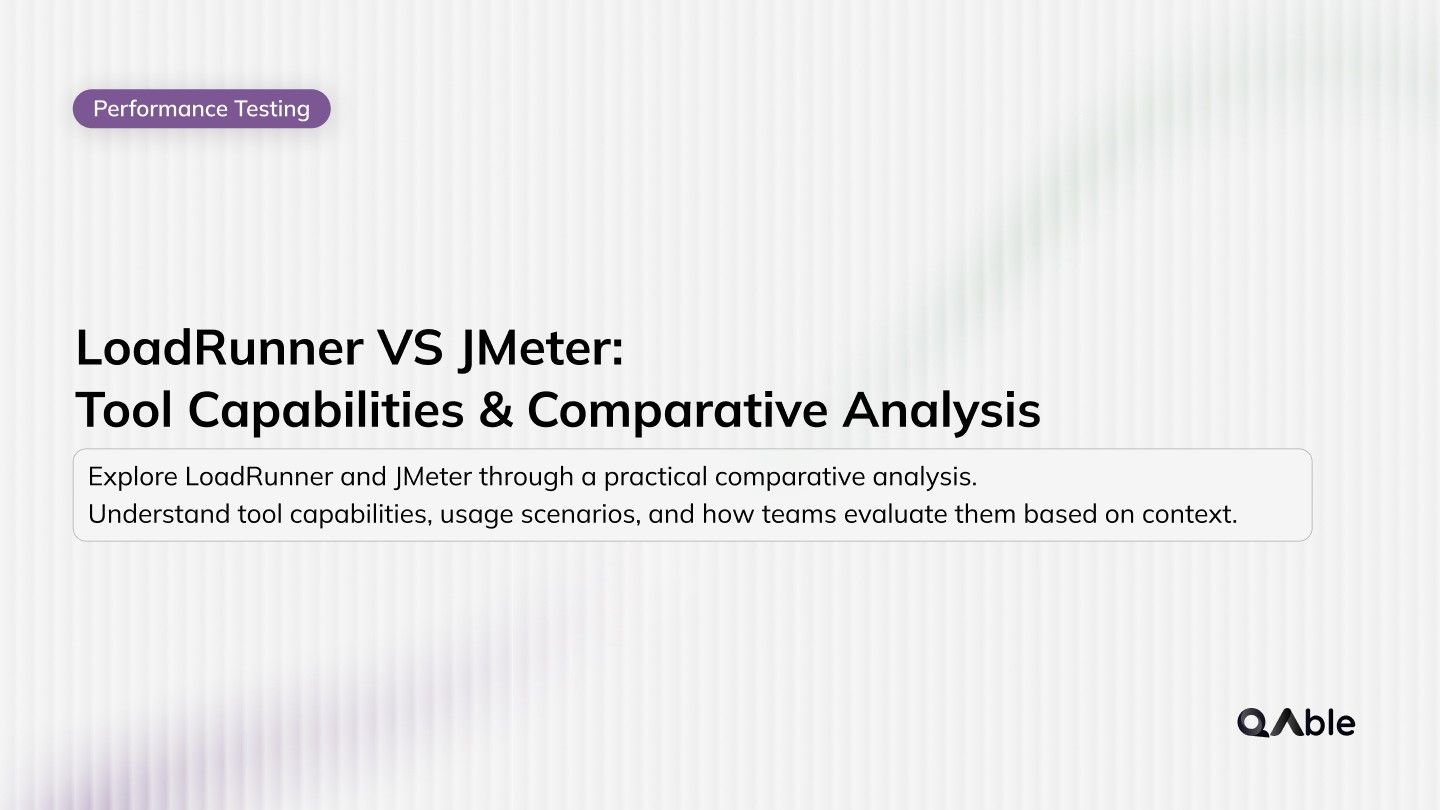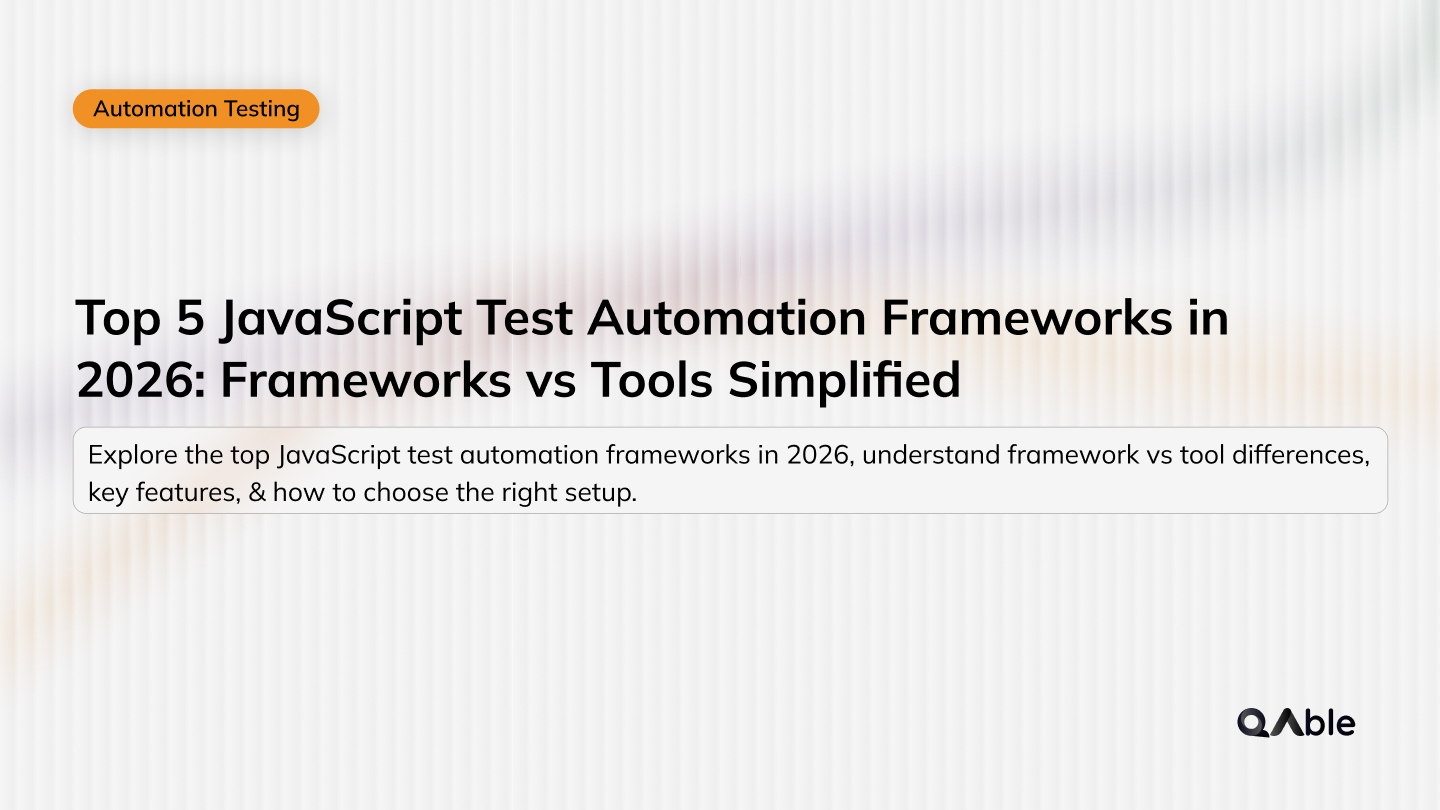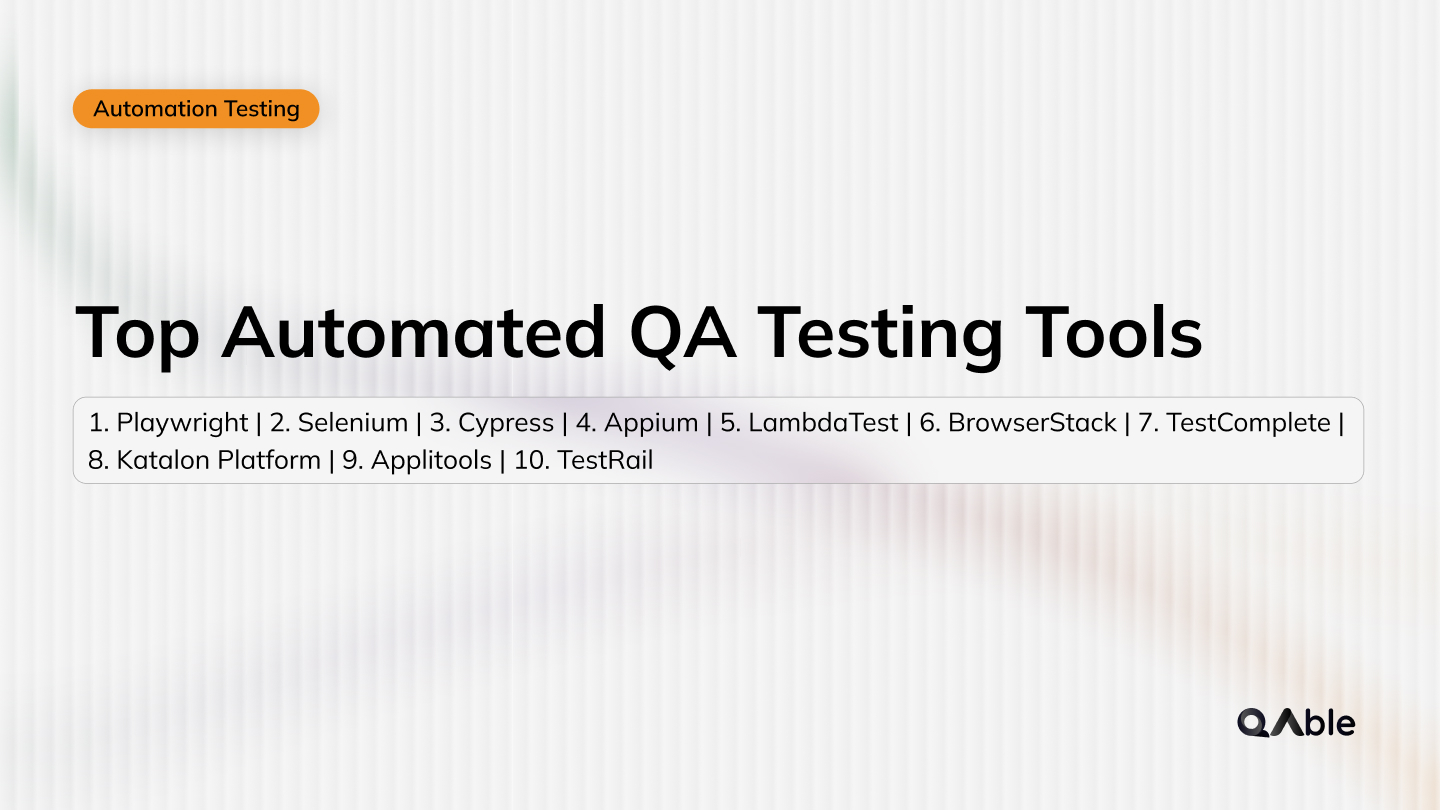Table of content
SHARE THIS ARTICLE
Is this blog hitting the mark?
Contact Us
The modern-day software development has become very complex. With so many moving parts combined to achieve the intended goals, the process of creating an application is not easy. Sure there are so many tools to create and test an application but there are no set guidelines to follow.
Different applications are developed in different ways. Even if two applications are developed for similar purposes, it's not mandatory for them to be made with similar architectures and components.
Once an application is complete, that’s not the end of the line. It has to be tested well before users can get their hands on it. You just can't make an application and call it a day. The application has be to tested for quality to make sure it’s free from errors and issues.
Software testers or QA experts employ manual and automated testing methods to ensure the quality of an application. Both testing methods are equally important to test an application in a complete way.
We talked about the complexity of modern software development at the start. The same complexity comes while testing applications. There are so many things to test in an application. Along with the complexity, there are repetitive tasks that can make the testing process more tedious.
These repetitive and complex tasks are usually handled by automation testing. However, it wouldn't be wrong to say that manual testing still comprises the major chunk of testing. But automation testing just cannot be skipped.
Automation testing frameworks make automation testing even more efficient and performant. In fact, they have become inevitable while testing modern applications. They have become a key component in the widely used agile workflows of the software development lifecycle or the SDLC.
Let’s get to know about the automation testing frameworks in greater detail. Along with that, we will also look into things like why it’s important and what tools we can use while including it in our testing workflows.
Table of Content
- What are automation testing frameworks?
- What are the key benefits of automation testing frameworks?
- What are the main types of automation testing frameworks?
- Top 6 Automation Testing Frameworks
- QAble As Your Expert Partner for Automation Testing
- FAQs
What are Automation Testing Frameworks?
Automation helps to get our tasks done in a faster and more efficient way. Now that we are talking about testing, automation speeds up the testing process. It is not at all the replacement for manual testing but it is the way to carry out repetitive and even complex tasks in an accurate manner.
Automation testing frameworks help to carry out automation testing in a systematic way.
But wait, does that mean that automation testing cannot be done in a systematic way? Actually, it can. An automation testing framework acts as an abstraction over automation. This helps to speed up the workflow even more.
What frameworks do is they provide a pre-defined set of ways or architecture of organization. Automation testing frameworks enable testers to work in sync in a certain way.
So how do frameworks help? Let's discover more about it.
What are the Key Benefits of Automation Testing Frameworks?
Automation testing itself is a great way to conduct tests in efficient ways. Before jumping into the automation testing frameworks, an overview of the global automation testing market can help shed light on its magnitude.
A report by Custom Market Insights (CMI) says that the Automation Testing Market is expected to reach a value of around $57 billion by the year 2030. The value stood at $17.5 billion in the year 2021. With a steady growth rate of 16% CAGR, the numbers were forecasted for the period between 2022 and 2030.
Now that we see these stats about the automation testing market, frameworks become even more important to be a part of this trend.
Here are some of the advantages or benefits offered by automation testing frameworks:
- It helps to test in a consistent way. The steps involved in automated testing such as planning, writing test cases, implementing and executing them, and monitoring them after they are completed can be done in a structured way.
- The modular nature of automation testing frameworks helps to keep the test scripts organized and easy to modify when required.
- It promotes the reusability of the test scripts as well. It also helps to keep the code DRY (Do not repeat yourself). This prevents the same code from being written multiple times for similar test scenarios.
- It helps to implement best coding practices. This also improves the readability of test scripts. Since the coding has to be done in standard ways and conventions, the maintenance for the same also becomes more manageable.
- It helps improve the efficiency of automation tests. This also promotes making clear and flexible strategies as per the requirements.
- Errors and exceptions can be handled in a better way. Since frameworks provide abstractions for them as well, it helps to keep the test scripts clean.
- It helps in better knowledge transfer or KT sessions for new team members. Since everything is already structured, the existing code logic can be explained to a new member in an easy way. This leads to improved productivity.
Also read: Best Automation Tools to Simplify QA for Email Marketing
What are the Main Types of Automation Testing Frameworks?
Deciding the type of automation testing framework suited for your product depends upon the requirements. Broadly, there are 6 main types of test automation frameworks.
Let’s go through them one by one:
Linear Framework:
- This type of automation testing framework is the most basic one.
- The test scripts are written step-by-step in a linear way.
- They are then run individually. In this type of automation testing, a single function is considered and test scripts are written for them.
- Linear automation testing frameworks are not reusable in most cases and require the least amount of expertise. The tests are also difficult to read and the steps are also very long in such cases.
Modular Framework:
- Modular means separation of concerns. This is a great way to conduct automation testing.
- The test scripts or codes are broken down into small pieces of functions.
- These functions can also be called as factory functions. These factory functions can be used dynamically wherever required. They can even be combined in different ways as per the requirements.
- Modular frameworks are very reusable too. But it requires some amount of expertise.
Data-Driven Framework:
- This automation framework works on the basis of input data. The test scripts and the data or parameters to be used in the test scripts are kept separately.
- The data can be stored in various formats like CSV, SQL, or Excel files.
- In short, the same test script can be run with different datasets. This makes the code reusable.
- The downside of this type of framework is that it requires a deep knowledge of the technical part of testing to write the reusable code.
Also read: Best Automation Testing Tools List
Keyword-Driven Framework:
- As the name suggests, this type of testing runs by keyword inputs.
- This can be used by a tester to get the required automation test scripts using keywords. The keyword and the related test case that it covers are written down in an external data file like CSVs in a tabular format.
- The test scripts can be generated accordingly with its help.
- This type of framework is also very reusable and user-friendly. But compiling these can be technically challenging and it is also very time-consuming.
Library Architecture Framework:
- Library architecture framework for automation testing relies on using abstracted code that may contain one or more functional implementations.
- It is very reusable since the test script or code can be imported from the library and can be used in many places. This also makes them highly scalable.
- It is just like the modular framework but way more complicated
- It requires very advanced knowledge of both the code side and the testing side. This makes them very complex to write.
Hybrid Framework:
- This type of automation framework uses two or more of the above-mentioned frameworks.
- This is a popular way in which automation tools are made.
- They are very flexible to use. In fact, they are widely adopted by the testing community to conduct most of the automation testing tasks.
Top 6 Automation Testing Frameworks
Let’s go through some of the frameworks that are widely used by software testing companies and the Quality Assurance (QA) teams for automation testing:
Selenium:
- It is a very popular and open-source tool. It is used mostly for web browser automation.
- Selenium automation testing can be used for creating any type of the above-mentioned framework.
- Due to its support for so many languages like JavaScript, Python, Java, C#, and Ruby On Rails, it is widely adopted by the QA testers.
- It provides a range of tools and libraries for maximum test coverage.
Appium:
- It is another open-source project that is used mainly to conduct automation tests for mobile and web.
- It provides a lot of tooling for iOS, Android, and Tizen for mobile app automation testing.
- Appium automation scripts can be written in JavaScript, Python, Java, Ruby On Rails, and many more.
- It can also be easily integrated with DevOps tools.
Also Read: QAOps in Quality Testing
Cucumber:
- This automation framework is widely used to do Behavior Driven Development or BDD.
- It is also an open-source project.
- It can help write automation testing scripts by using just the test plans and the concerned business documentation of a project.
TestNG:
- It is a testing framework for Java language.
- It supports most testing frameworks like hybrid frameworks, data-driven frameworks, etc.
- It is capable of conducting most types of testing such as unit testing, functional testing, end-to-end testing, and integration testing.
Robot Framework:
- It is usually adopted as a keyword-driven testing framework.
- It is also an open-source project that is mainly used for acceptance testing.
- The test cases and test scripts are defined in a tabular format.
- These test cases can be written using a Robot Integrated Development Environment or (RIDE). The text format can be plain text and tab-separated values (TSV)
Cypress:
- It is an open-source JavaScript testing framework.
- With its automation features for DevOps and CI/CD support, QA engineers have adopted it for doing End-To-End testing, Integration testing, Component testing, and Unit Testing.
QAble As Your Expert Partner for Automation Testing
As a leading software testing company in India, QAble offers testing services for Automation Testing Frameworks. QAble has a team of expert testers who can help you choose, design, implement, and maintain the best Automation Testing Framework for your product.
QAble can help you to achieve the following benefits with your Automation Testing Framework:
- Save time and effort by automating your test cases
- Improve software quality by increasing test coverage and reducing defects
- Enhance test performance by optimizing test execution and reporting
- Reduce testing costs by reusing and maintaining test scripts
- Increase customer satisfaction by delivering reliable and consistent software products
Discover More About QA Services
sales@qable.ioDelve deeper into the world of quality assurance (QA) services tailored to your industry needs. Have questions? We're here to listen and provide expert insights


Nishil Patel is the Co-founder of QAble, delivering advanced test automation solutions with a focus on quality and speed. He specializes in modern frameworks like Playwright, Selenium, and Appium, helping teams accelerate testing and ensure flawless application performance.
.svg)














.webp)
.webp)
.png)
.png)











.png)



.png)

.png)

.png)






.jpg)














.webp)

